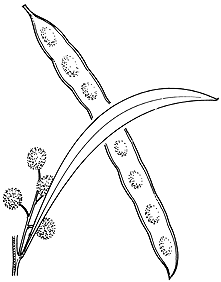Common name: tableland wattle
Acacia caesiella Maiden & Blakely APNI* 
Description: Erect or spreading shrub 1–3.5 m high, sometimes a small tree to 5 m or more high; bark smooth, grey or brown; branchlets angled at extremities, appressed-hairy.
Phyllodes narrowly elliptic to linear, ± straight or curved, usually 4–10 cm long and 3–7 mm wide (rarely c. 2 mm wide), with appressed fine hairs, glabrescent with age, bluish green, ± glaucous, midvein prominent, lateral veins faint, apex acute with a mucro; 1 small gland 3–17 mm above pulvinus; pulvinus to 2 mm long.
Inflorescences 4–14 or sometimes more in an axillary raceme; axis usually 1–6 cm long; peduncles 2–4 mm long, appressed white-hairy; heads globose, 12–20-flowered, 4–6.5 mm diam., yellow, bright yellow or deep yellow.
Pods straight to slightly curved, ± flat, ± straight-sided to barely or irregularly more deeply constricted between seeds, 4–9 cm long, (6-) 7–10 mm wide, firmly papery to thinly leathery, glabrous or with sparse minute appressed hairs, ± pruinose; seeds longitudinal; funicle filiform.
Flowering: July–October.
Distribution and occurrence: chiefly on the Slopes, from Burrenjuck in the south and east to Mt Coricudgy and west to Baradine district. Grows in dry sclerophyll forest and woodland, often on rocky sites.
NSW subdivisions: ?NT, CT, NWS, CWS, SWS
The name is derived from 'caesiellus' meaning somewhat blue-grey, which refers to the glaucous nature of Acacia caesiella. A possible variant of A. caesiella and/or intermediates with A. barringtonensis occur in Gibraltar Range (NT).
Text by P.G. Kodela (updated Apr 2012)
Taxon concept: P.G. Kodela & G.J. Harden, Flora of NSW Vol. 2 (2002)
APNI* Provides a link to the Australian Plant Name Index (hosted by the Australian National Botanic Gardens) for comprehensive bibliographic data
***The AVH map option provides a detailed interactive Australia wide distribution map drawn from collections held by all major Australian herbaria participating in the Australian Virtual Herbarium project.
|


